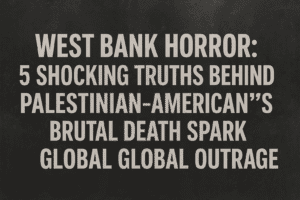West Bank Horror: 5 Shocking Truths Behind Palestinian-American’s Brutal Death Spark Global Outrage
A 20-year-old Palestinian-American man, Saif al-Din Musalat, was beaten to death by Israeli settlers in the occupied West Bank village of Sinjil while defending his family’s land from encroachment. His family states settlers deliberately blocked paramedics from reaching him as he lay fatally injured, leading to his death before hospital arrival. A second Palestinian, 23-year-old Mohammed al-Shalabi, was shot dead during the same incident and reportedly left bleeding for hours.
While Israeli military authorities acknowledge the violence began after Palestinians threw rocks—lightly injuring two Israelis—and promise an investigation, human rights groups emphasize a documented climate of settler impunity in the territory.
Musalat’s grieving U.S.-based family has urgently demanded the State Department intervene to secure accountability and justice. This killing starkly tests Washington’s willingness to protect its citizens abroad and confront ally misconduct. It underscores the lethal reality of land disputes and unchecked violence facing Palestinians under occupation, intensifying since the Gaza conflict began.

West Bank Horror: 5 Shocking Truths Behind Palestinian-American’s Brutal Death Spark Global Outrage
The news report paints a stark, horrific picture: Saif al-Din Kamil Abdul Karim Musalat, a 20-year-old Palestinian-American, beaten to death by Israeli settlers in the occupied West Bank village of Sinjil. His family’s statement cuts through the political noise with raw, human agony: “This is an unimaginable nightmare and injustice that no family should ever have to face.”
Beyond the headline lies a deeply personal tragedy demanding our attention:
- A Life Cut Short Protecting Home: Saif wasn’t caught in crossfire. His family states he was “protecting his family’s land from settlers who were attempting to steal it.” This places his death squarely within the volatile context of land disputes and settler encroachment, a persistent flashpoint in the West Bank.
- The Cruelty of Denied Aid: The family’s account adds a layer of profound cruelty: settlers allegedly blocked paramedics from reaching Saif as he lay injured. He died before reaching the hospital. This alleged obstruction of medical care, if verified, represents a grave violation of basic humanity and international norms.
- A Second Life Lost: Mohammed Rizq Hussein al-Shalabi, 23, was also killed during the incident, reportedly shot and “left to bleed for hours.” Two families shattered in one violent encounter.
- The Chilling Context of Impunity: Human rights groups and the UN consistently warn about escalating settler violence in the West Bank, often occurring in a climate of “impunity.” Saif’s death tragically exemplifies these concerns. The Israeli military’s statement – citing Palestinians throwing rocks first, lightly injuring two Israelis, and promising an investigation – is a familiar refrain that offers little solace to grieving families who have seen few perpetrators held accountable.
- An American Citizen, A Test for Washington: Saif held US citizenship. His Tampa-based family’s plea is direct and urgent: “We demand the US State Department lead an immediate investigation and hold the Israeli settlers who killed Saif accountable for their crimes. We demand justice.” This transforms a tragic local incident into a significant test of US policy and its willingness to protect its citizens and advocate for accountability, even when it involves a close ally. The State Department’s initial response – awareness without comment “out of respect for the family’s privacy” – feels starkly inadequate against the family’s explicit demand for action.
- The Shadow of Escalation: The report notes the surge in West Bank violence since the October 2023 Gaza conflict. While distinct from Gaza, the atmosphere of heightened tension and violence perme
You must be logged in to post a comment.